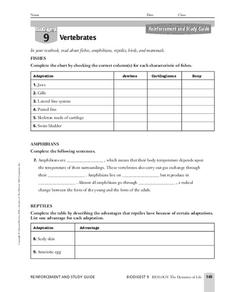Curated OER
Classification of Life
In this classification of life worksheet, students use an on line source to answer questions about how species are classified, named and grouped. They give the classification of a bear, an orchid and a sea cucumber.
University of Hawaiʻi
Taxonomy and Me!
Taxonomy is the study of organisms and how you phylum. Three biology activities are included, helping scholars understand four of the six kingdoms, specifically Protista, Plantae, Fungi, and Animalia. Scholars observe and classify...
Curated OER
The Joy Luck Club: Bloom's Taxonomy: Questions
Really challenge your class when they're reading Amy Tan's The Joy Luck Club. Provide them with this list of six thought-provoking questions to encourage a deeper analysis. The questions are based off of Bloom's Taxonomy, and a list of...
Curated OER
Classification of Organisms
In this classification instructional activity, students solve 3 classification riddles, complete 6 true and false questions, complete 4 sequences, and solve a riddle about the classification of an animal.
Curated OER
AP: Chapter 26: Origin of Life
Five pages take biologists on a generalized survey of the origin of life. Queries are made regarding theories of how life developed, ancient Earth conditions, and the ever-changing field of taxonomy. The experiments of different...
Curated OER
Classification and Adaptations- Streams, Rivers, and Lakes - Where the Land Meets the Sea And Caribbean Reef
In this science worksheet set, students answer 14 short answer questions about the classification and adaptation of life in streams, rivers, and lakes. They also answer 15 questions about life "Where the Land Meets the Sea" and in a...
Curated OER
Classification of Words and Ideas
In this classification worksheet, students pick the words that do not belong, make up the title for groups of words, and choose the title for the group of words. Students complete 3 activities.
Curated OER
Classification
In this classification worksheet, students will look at how biological classification began and how scientific names are used in biology. Students will use a table showing the classification of four organisms to answer 10 short answer...
Curated OER
Classifying Life
In this classifying life worksheet, students review the 5 kingdoms of organisms by completing 10 matching and 7 fill in the blank questions.
Curated OER
Organizing Life
In this classification worksheet, students will review vocabulary words associated with the organization of living things which includes kingdom, phylum, class, order, family, genus, and species. This worksheet has 5 fill in the blank...
Curated OER
Taxonomy
In this biology worksheet, students complete a crossword puzzle with 39 questions on taxonomy. They identify the different classification systems used in biology.
Casimir Middle School
Biological Classification Worksheet
Classify living things with a set of worksheets that has pupils sorting and indentifying living and non-living things. Learners use the worksheets as a basis for finding their answers.
Curated OER
Stars Lab
After making a list of top 10 brightest stars, your class will learn to classify the colors of the hottest and coolest stars. The spectral classes will help with understanding of nuclear fusion and the life of a star.
Curated OER
Ocean Life Zones
In this ocean worksheet, students answer questions about ocean life, the plants and animals of the ocean and their classification, the major life zones of the ocean and questions about an animal of their choice that lives in the ocean.
Curated OER
Vertebrates
In this vertebrate worksheet, students review the different adaptations for the 5 groups of vertebrates: birds, mammals, reptiles, amphibians, and fishes. This worksheet has 12 matching, 1 fill in the blank, and 7 short answer questions.
Allegany-Limestone Central School
Plantae WebQuest
Send your young life scientists on a plant webquest that has them reading case studies to decide if seeds are seeds and plants are plants.
Curated OER
Life Cycle: Diversity in a Balance 4th Grade Workbook
In this life cycle workbook, 5th graders examine plant and animal cells, classification of organisms, human biology, photosynthesis, and natural environments. 21 different activities make up the Life Cycle Workbook.
Curated OER
Distinguishing Between Flowers
A branching key is a great way to classify different types of animals and plants! Fifth graders answer several yes/no answers about three different plants. They then create their own key to differentiate between an iris, a rose, and a...
Curated OER
Life Has A History
In this biology worksheet, students identify and match various classes of species found today. Then they explain why biodiversity exists today on earth and define evolution. Students also describe who a paleontologist is and what they do.
Curated OER
Classifying Living Things
In this classification worksheet, students read a description of how all living things are related and describe a diagram showing how this taxonomy works. Students answer five questions related to their reading.
Lerner Publishing
Meet the Dinosaurs
Take your class of youngsters on a prehistoric adventure with this four-lesson series on dinosaurs. Accompanying the Meet the Dinosaurs books by Don Lessem, these lessons engage children in writing their own dinosaur books,...
Curated OER
Questions - Appearances are Deceiving
Five evolution-related questions are answered by beginning biologists on a separate sheet of paper. First, they are asked to list adaptations that allow organisms to survive under various conditions. The second question refers to...
Curated OER
AP: Chapter 18: Microbial Models
AP biology and college microbiology classes benefit by completing this seven-page learning exercise on microbes. An exhaustive set of questions addresses the characteristics and reproduction of viruses, classification and uses of...
K5 Learning
Ann and Frank
Challenge your third and fourth graders to look deeply into a text with a reading comprehension activity. After learners finish the short passage, they answer four questions that range in levels of difficulty and analysis.























